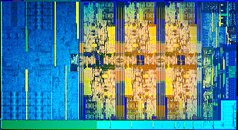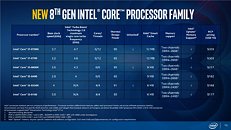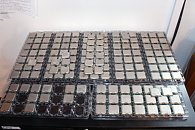Thursday, October 12th 2017
On Intel's Decision to no Longer Disclose All-core Turbo
Intel is no longer going to disclose all-core Turbo Boost speeds, starting with their 8th Gen Coffee Lake processors that have just been released. The information comes straight from the blue giant. Answering a query from ExtremeTech on the matter, the company said that "[W]e're no longer disclosing this level of detail as its proprietary to Intel. Intel only specifies processor frequencies for base and single-core Turbo in our processor marketing and technical collateral, such as ARK, and not the multi-core Turbo frequencies. We're aligning communications to be consistent. All Turbo frequencies are opportunistic given their dependency on system configuration and workloads."
This decision is a rollback that does little more than rob users of another data point that has really always been there. The practical effect of this change isn't anything to write home about: Intel's Turbo Boost capabilities were never guaranteed performance levels (the fact that the advertised Turbo speeds were called "Max Turbo" implied Turbo levels could be lower.) However, there's also not much that can be said to explain this change in stance from the blue giant. If anything, this decision only opens up debate and speculation regarding the reasons why Intel is making this change: and the skeptics among us will always default to foul play or dark linings.To our Forum dwellers: this piece is marked as an Editorial
For one, it could be said that Intel is doing this in order to unlock a lot more leeway in CPU binning. Absent all-core turbo speeds means that Intel now only has to guarantee two levels of performance for each of its chips: all-core base clocks (which for the 8700K, for example, is set at 3.7 GHz), and single-core Turbo (a more impressive 4.7 GHz). These are the only frequencies Intel now has to make sure all of their 8700K chips hit. This gives a whole new weight to the "silicon lottery" concept, in that now users can be saddled with the most basic 8700K that only achieves an all-core clock of just 3.7 GHz and not a switch more, or an amazing chip that hits 5.3 GHz easily.
Pore over Intel's ARK page, and now the 8700K processor is being listed as having a max Turbo frequency of 4.7 GHz - but that one frequency only really applies to single-core Turbo. So not only do Intel CPUs now look better to the unwary, distracted user (what, max 4.7 GHz on six cores, that's insane), but now there's also the chance of something like this happening: "So what if your unlocked K processor doesn't overclock a single MHz on all cores? We don't really specify it should be able to, do we?"To add to the confusion, it's also worth mentioning the "MultiCore Enhancement" option that most Intel motherboards ship with, which when enabled, overrides even Intel's previous maximum all-core Turbo Boost specs. Now, even if users and reviewers disable the option to find out what's Intel's rated (and now hidden) max Turbo Boost for any given processor, there's no guarantee that the frequencies achieved will be the same for all processors of the same product name. After all, different OC potential exists among chips according to die quality - and the fact that most motherboards now feature CPU voltages set on Auto should add to this scenario, with some CPUs requiring lower voltages to achieve higher clockspeeds than others, which theoretically, should mean different auto Turbo limits according to power consumption and thermal headroom. At the extreme of this situation, it might be impossible for reviewers to achieve parity on CPU reviews absent of disabling all-core Turbo features, since there won't be a baseline value they can consider: CPUs will be reviewed with all-core Turbos that are dependent on CPU quality and automated Turbo Boost. Unless all tech review sites agree on a globally accepted all-core Turbo speed, but that's slightly utopian, at the very least.Skepticism aside, the main issue here, I feel, is that the decision was made without any clear focus or mention as to why. Now yes, Intel might not have any shady reason for doing this - but nevertheless, there is a reason behind this decision; otherwise, the company just wouldn't make the move. All of the above scenarios are result of one thing only: the absence of clear communication, which ends up with users scratching their heads at a seemingly opaque decision.
Sources:
ExtremeTech, Intel ARK
This decision is a rollback that does little more than rob users of another data point that has really always been there. The practical effect of this change isn't anything to write home about: Intel's Turbo Boost capabilities were never guaranteed performance levels (the fact that the advertised Turbo speeds were called "Max Turbo" implied Turbo levels could be lower.) However, there's also not much that can be said to explain this change in stance from the blue giant. If anything, this decision only opens up debate and speculation regarding the reasons why Intel is making this change: and the skeptics among us will always default to foul play or dark linings.To our Forum dwellers: this piece is marked as an Editorial
For one, it could be said that Intel is doing this in order to unlock a lot more leeway in CPU binning. Absent all-core turbo speeds means that Intel now only has to guarantee two levels of performance for each of its chips: all-core base clocks (which for the 8700K, for example, is set at 3.7 GHz), and single-core Turbo (a more impressive 4.7 GHz). These are the only frequencies Intel now has to make sure all of their 8700K chips hit. This gives a whole new weight to the "silicon lottery" concept, in that now users can be saddled with the most basic 8700K that only achieves an all-core clock of just 3.7 GHz and not a switch more, or an amazing chip that hits 5.3 GHz easily.
Pore over Intel's ARK page, and now the 8700K processor is being listed as having a max Turbo frequency of 4.7 GHz - but that one frequency only really applies to single-core Turbo. So not only do Intel CPUs now look better to the unwary, distracted user (what, max 4.7 GHz on six cores, that's insane), but now there's also the chance of something like this happening: "So what if your unlocked K processor doesn't overclock a single MHz on all cores? We don't really specify it should be able to, do we?"To add to the confusion, it's also worth mentioning the "MultiCore Enhancement" option that most Intel motherboards ship with, which when enabled, overrides even Intel's previous maximum all-core Turbo Boost specs. Now, even if users and reviewers disable the option to find out what's Intel's rated (and now hidden) max Turbo Boost for any given processor, there's no guarantee that the frequencies achieved will be the same for all processors of the same product name. After all, different OC potential exists among chips according to die quality - and the fact that most motherboards now feature CPU voltages set on Auto should add to this scenario, with some CPUs requiring lower voltages to achieve higher clockspeeds than others, which theoretically, should mean different auto Turbo limits according to power consumption and thermal headroom. At the extreme of this situation, it might be impossible for reviewers to achieve parity on CPU reviews absent of disabling all-core Turbo features, since there won't be a baseline value they can consider: CPUs will be reviewed with all-core Turbos that are dependent on CPU quality and automated Turbo Boost. Unless all tech review sites agree on a globally accepted all-core Turbo speed, but that's slightly utopian, at the very least.Skepticism aside, the main issue here, I feel, is that the decision was made without any clear focus or mention as to why. Now yes, Intel might not have any shady reason for doing this - but nevertheless, there is a reason behind this decision; otherwise, the company just wouldn't make the move. All of the above scenarios are result of one thing only: the absence of clear communication, which ends up with users scratching their heads at a seemingly opaque decision.





89 Comments on On Intel's Decision to no Longer Disclose All-core Turbo
IntelAMD make it well known that core(s) Overclocks were Dependent on the Cooling solution Applied to the CPU(Yes)
But, that intel, big bad wolf!
Well, it's not so much different this case, is it? 10 people get an i5 8400, 10 people end up with different performance numbers. And those i5's send to reviewers, could easily be golden samples.It means that you can have the same performance from different chips. When a processor is locked, an inferior quality chip compared to the golden sample send to the press, or even the average retail chip, will be performing worst. How much worst? We don't know yet, but in any case you can't "fix" that, by changing some option in the BIOS or something. When the chip is unlocked, you do have that option by choosing a Turbo something option in the BIOS, in the manufacturer's software running in Windows or by just overclocking it. There is a difference.Can you improve the performance of a locked processor with cooling? You can make it worst with a bad cooler, but can you make it better? I am not talking about processors that throttle here, but about same model processors that are configured differently from the factory. Maybe I understand it wrong, don't know.
Also regarding the golden samples, at the end of every review that's out there the words "Please note that our sample has". None of the chips would perform the same, they never had.
Anything else outside of that is pure speculation.
Edit: and the dude i replied to, john, deleted multiple posts... wth?????
All the boost states inbetween. CPU boosts to different clocks when 2, 3, 4, 5 or however many cores are loaded. Less loaded cores, more boost. That has a large part to play in how much of that information can be stated as a fact. There are too many variables.
This does not mean that there is no internal function to determine these boost clocks but that is also dynamic to some degree, not a fixed table.
Why the hell did that dude delete his posts??? Wth is going in here????
EDIT: And now they are gone again... on my desktop machine...
I know I need to click to see his posts as I put the guy on ignore ages ago... but those messages aren't even there... posts are simply.. GONE. LOL!
EDIT2: You CAN see quotes from those who are ignored... I believe it says ignored member. I removed you off the ignore list and can now see the posts.. but something was fucked up here, likely on my side....
Either way, unlocked/locked has nothing to do with this, nor does overclocking. This is a factory spec which just isn't listed. It doesn't mean it is going away or that there are dubious/nefarious actions behind it.
And why you bother rushing to post that I delete my posts.
Maybe because no matter what I post, you will ALWAYS have a complete different perspective about that? Because you ALREADY have made up your mind BEFORE you even read what I post? And of course in cases like this, where someone has blocked someone else, if I post something with which you do agree, you will probably avoid mentioning it anyway.
Thanks for clarifying that and saving me future time.
PS If you want to see posts from members you have blocked, just open a private tab. That way you can read their posts in the private tab, and reply from a regular tab where you will still be logged in.
...
Sorry, I is grumpy in the mornings.
I mentioned the posts were deleted as it could have been a forum issue or for any other reason. :)
I like to have faith in people... sometimes they have a bad day, or a week. And after a while will check and see if they chilled out.
Guess not...back to ignore. :(
Apologies for the confusion i caused. :)
Get a coffee.On second thought, better don't get a coffee. Caffeine not good in these cases. My bad.It's called "defusing the situation"
I also didn't name anyone on purpose. You seem to be quite content to be angry anyways though, so have fun with that.
*Gets some caffeine*
Both these clocks are published by both Intel and AMD. I will use lower range models for examples as the ranges are wider there:
Ryzen 7 1700 has base clock of 3.0GHz and Precision Boost of 3.7GHz. In reality, 1700s will generally run at 3.2GHz with all-core load.
i7 7700 has base clock of 3.6GHz and Max Turbo 4.2GHz. Intel has also published the frequency table for it showing that Max Boost for 1 core load is 4.2GHz, for 2 core load 4.1GHz and for 4 core load 4.0GHz.
However, there are a number of 'but'-s in there.
- Base clock is worst case scenario, in Intel's case that actually means including full AVX load (with offset). I am not sure what base clock means for AMD.
- Max Boost and Precision Boost clocks are not the end of things either. Intel has (or had as they seem to have hidden or discontinued it and it required software support) Boost 3.0 boost that was 100mhz higher. AMD has XFR (+50/100MHz) that requires X370 motherboard and is opportunistic.
- As you can see from above both Intel and AMD CPUs actually boost higher than base clock with all cores being loaded.
- There are variables in place that will drag down clock speeds and throttle the processor. Most notably, temperature and TDP.
None of this will change. Intel just feels they no longer want to publish the table of potential maximum clock speeds for each number of loaded cores. It is worth noting that AMD does not publish this information either and based on what is publicly available, Turbo Core is more simple around how clocks are determined.
The main reason for not wanting that table published is probably liability as has been mentioned a bunch of times in this thread. When they publish it, customers may feel (justified or not) these clocks are guaranteed when these are just the baseline for determining the current viable clock speed.
There are also technical changes in recent Intel processor families that may have contributed to the decision. AVX/AVX2 is already wreaking havoc in Intel processors when it comes to clock speeds, power consumption and temperatures. Now they are adding AVX-512 starting with HPDT. Intel also seems to be pushing the 1-2-4 core load across the board higher than ever before. Almost across the entire range of last generations the Max Boost is 4.x GHz with very few exceptions. over 4GHz from 4 cores to 18 cores is a wide range. Trying to manage that in given limitations must be hell and that is pushing the frequency ranges to be very wide. This is mostly done with tweaking the Turbo Boost rather than other technical changes. Why they are doing everything to achieve that is probably thanks to Ryzen. If they let low-threaded clocks slip, the gaming edge of Intel's CPUs is lost.
Coffee Lake is in its core still the same Skylake/Kaby Lake and 14++nm process is just a minor improvement.
Take a look at the prime suspect for Intel being malevolent (i5 8400) and compare it to its direct predecessor (i5 7400): ark.intel.com/compare/126687,97147
- Now 6 cores need to be fit in the same 65W TDP. That logically means something has to give - and that something is base clock speed that decreased by 200MHz (which is not a bad result from technical perspective).
- The other end is trying to boost the low-core boost clock as I mentioned in previous paragraph. Single core at 4.0GHz is 500Mhz higher than i5 7400 which will no doubt have serious positive effect on single-core perf level.
I do not see any of this as particularly suspicious.
I can't punch people through the internet, I've tried...
Its Coming :)
it will be a further Development of the Interactive Accessorys Currently restricted to
Its Cominginteractive Sex toys